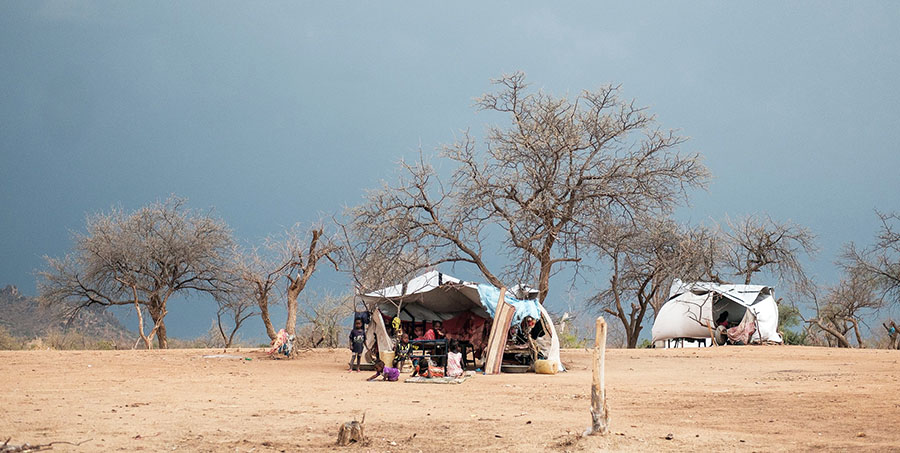
Suffering Besets the Nuba Mountains, Expectations of Deterioration
Moatinoon
Residents in the Nuba Mountains region of South Kordofan State described the humanitarian situation as catastrophic, with expectations that it will deteriorate further with the arrival of this years rainy season.
According to a report by thenewhumanitarian, scenes of fresh and ancient graves line the roads of one area in the Nuba Mountains. Local residents say they belong to those who died of starvation last year during the worst food crisis in modern history.
Residents warned that the situation will worsen this year with the arrival of the rainy season amidst reduced aid funding and escalating fighting.
"We expect many to die this year," said Namariq Ali, a pharmacist at a hospital that receives patients from areas surrounding the mountainous region, located in South Kordofan State near the border with South Sudan.
Namariq estimated that about 400 patients—many of them pregnant women and children—pass through the doors of her hospital in the town of Tojok daily, in desperate need of food and care.
The impact of the war that broke out on April 15, 2023, which has created one of the worlds largest displacement and hunger crises, has been particularly severe in the Nuba Mountains, controlled by the Sudan Peoples Liberation Movement-North (SPLM-N).
Nearly a million people have sought refuge in the area, but aid organizations have struggled to deliver supplies. The SPLM-N has clashed with the Sudanese Armed Forces (SAF) and the Rapid Support Forces (RSF) at various times, and both groups have blocked humanitarian access.
It is feared that this years increased displacement and poor harvest will further worsen the situation for the population, who are not receiving regular food aid and have no source of income.
Famine was declared last year in the western part of the Nuba Mountains by the Integrated Planning Commissions Famine Review Committee, the worlds leading authority on food insecurity, while the central Nuba Mountains—visited by thenewhumanitarian on a reporting trip in April—was declared an area at risk.
Many residents described last year as the worst of their lives, while medics, aid workers, and SPLM-N officials warned that this year could be even worse, as US funding cuts impact the few aid organizations operating in the remote region.
Others said the situation would deteriorate because the SPLM-N recently allied with the Rapid Support Forces (RSF)—despite the paramilitarys abuse of many civilians in South Kordofan—drawing the region directly into conflict.
In an interview with The Humanitarian, Amar Amon, secretary-general of the SPLM-N, acknowledged that the humanitarian situation in the Nuba Mountains was "dire" and said the movement was anticipating a severe crisis during the upcoming rainy season.
Amon confirmed that fighting had escalated following the SPLM-N alliance with the RSF, and acknowledged that this could increase the number of displaced people.
"This alliance is definitely going to exacerbate the humanitarian situation," said Hafiz Mohammed, director of Justice Africa, a Nuba Mountains-based organization.
Monika Leyendecker, a doctor at a hospital in the town of Loire who works with the German NGO Cap Anamur, said that during the height of last years hunger, patients were leaving their beds at night in search of food, while she had to ration supplies to hospital staff.
Leyendecker added that the situation this year appears to be just as dire, with hospital admissions due to hunger rising earlier than usual—before the rainy season, when roads are cut off, food stocks run low, and malaria and waterborne diseases spread more rapidly.
Source: thenewhumanitarian.org

